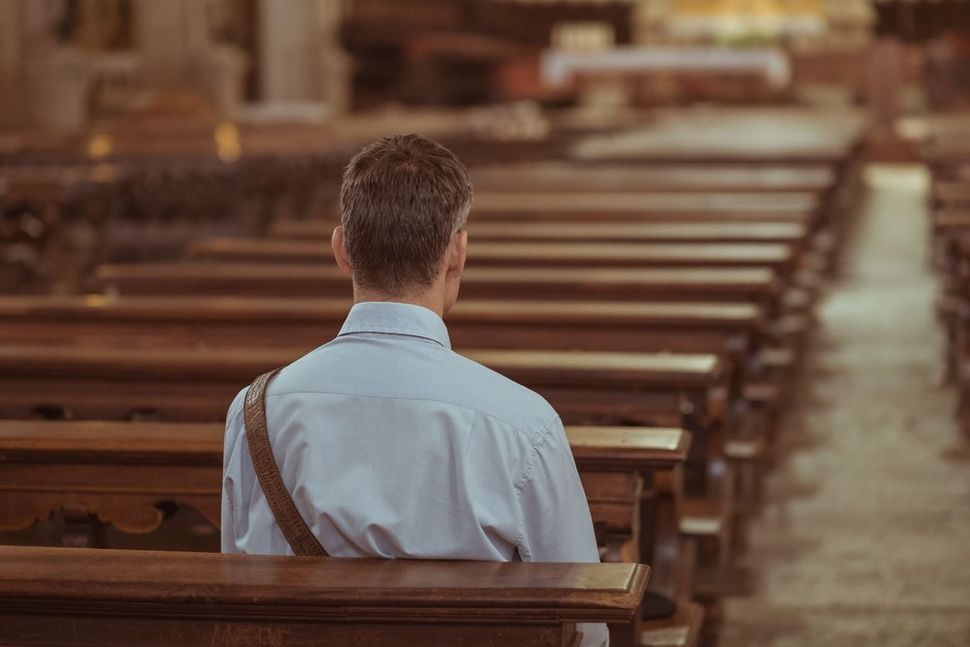Welcome to the lonely pew

Image by iStock
This year will be different. The High Holidays are traditionally a moment for connection and community, but this year’s ongoing pandemic has moved our observance online. Travel home, meals with family and friends, heading to services (whether willingly or unwillingly) – all of this has been replaced with screen time. Sanctuaries have been turned into production studios, our living rooms into synagogues. We enter the new year grappling with loss, disconnected from the people and traditions that help make this season familiar. This feeling is only compounded by the tragedies of these past few months. Out of necessity, we will pray apart – and more than likely, some of us will pray alone.
I understand what it is like to celebrate the holidays by yourself. Recently, I marked 10 years since my conversion to Judaism. I remember the excitement of my first Rosh Hashanah.
It was a crisp and cool midwestern morning, the kind that hints at the coming fall. I arrived early to find a seat close enough to the front to see what was going on, far enough back so that the other congregants could cue when to stand up, sit down or bow. S
Slowly, the pews around me filled in: multigenerational families, couples, and clusters of friends. Neighbors greeted each other from across the sanctuary. Every now and then, someone would ask me if the seat next to me was taken. It wasn’t. While my conversion course had equipped me with knowledge and hands-on experience, it could not give me a Jewish family.
This kind of isolation is an experience shared by many converts. It is the lonely pew. It is the quiet walk home after services and meal for one. It is always being the guest. Our Judaism requires a particular kind of initiative. Where others have inherited the rhythms and traditions of their families, we must create our own. We lack the assumed bonds of summer camp, youth group or Hillel. Our Jewish geography is limited. And come the holidays, when attention turns to the value and importance of family, we are reminded that we made the choice to leave our community of origin to make our own journey.
The past decade has seen me spend fewer holidays alone. It’s taken some initiative, from learning how to host my own Passover seder to setting up my hanukkiah next to the family Christmas tree. I still encounter those lonely moments, but they are rarer. I owe some of this to my own efforts, but more so I am indebted to those who have chosen to show up: my Jewish family of choice, composed of relatives, friends, and neighbors who noticed my isolation and met it with the gift of their presence.
When the Temple stood in Jerusalem, our ancestors would make a pilgrimage to observe important holidays. Like the standing and sitting of our services, the rabbis explain the choreography of their visit. As each person entered the courtyard, they would walk around in a counterclockwise direction before exiting the way they had come in.
That is, everyone except for the person who had experienced loss. This individual would enter the courtyard and walk in a clockwise direction, against the flow of traffic. As they passed each person, those who encountered them were obligated to ask, “Mah lecha, why do you walk in the opposite direction?” If they answered, “Because someone I love has died,” the other would say, “May the One who dwells in this house comfort you.” If they answered, “Because I am cut off from my community,” the other would say, “May the One who dwells in this house bring them near you again.” The person who had come to the Temple separated from others by grief and loss was met by a community of care, created by those who chose to see them in their isolation.
Converts are not the only ones who observe the holidays alone. Families break apart for innumerable reasons, whether by the vagaries of life or through our own difficult choosing. Children are rejected by prejudiced parents.People make the painful decision to leave abusive partners. The elderly and homebound go weeks without human contact. In the spaces between the families who usually fill our pews are those we have failed to notice: not only the person sitting alone, but the individual who has not shown up at all.
Each of us is born with the ability to empathize with the pain of others, digging into our own history of loss to find the part of ourselves that resonates with their experience. This is what enabled our ancestors to recognize and address those who walked to the left, carving a lonely path through the happy pilgrimage. Their words of comfort came from a place of empathy, an understanding of what it meant to lose a loved one or be cut off from community.
These High Holidays, our joy is tempered by isolation. Yet this necessary distance gives us a new touchpoint; our seclusion has made it impossible to ignore the loneliness of others. Welcome to the lonely pew. While presence and compassion may be all we can offer, our tradition teaches that it can be enough.
Steven Philp is a rabbi at the Park Avenue Synagogue.
















